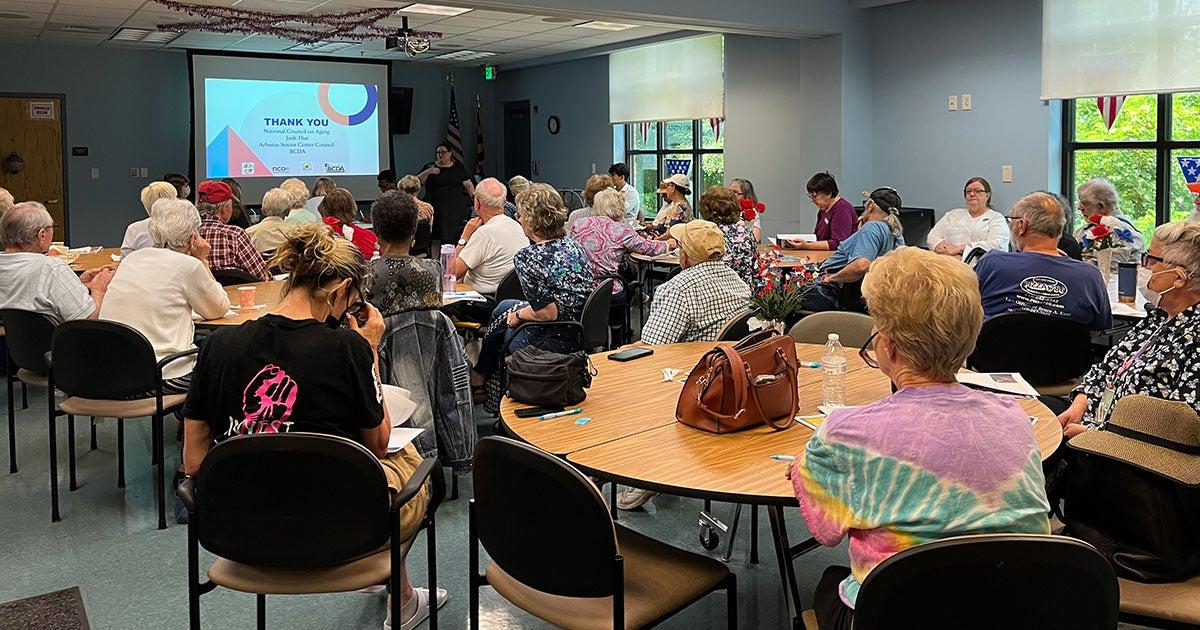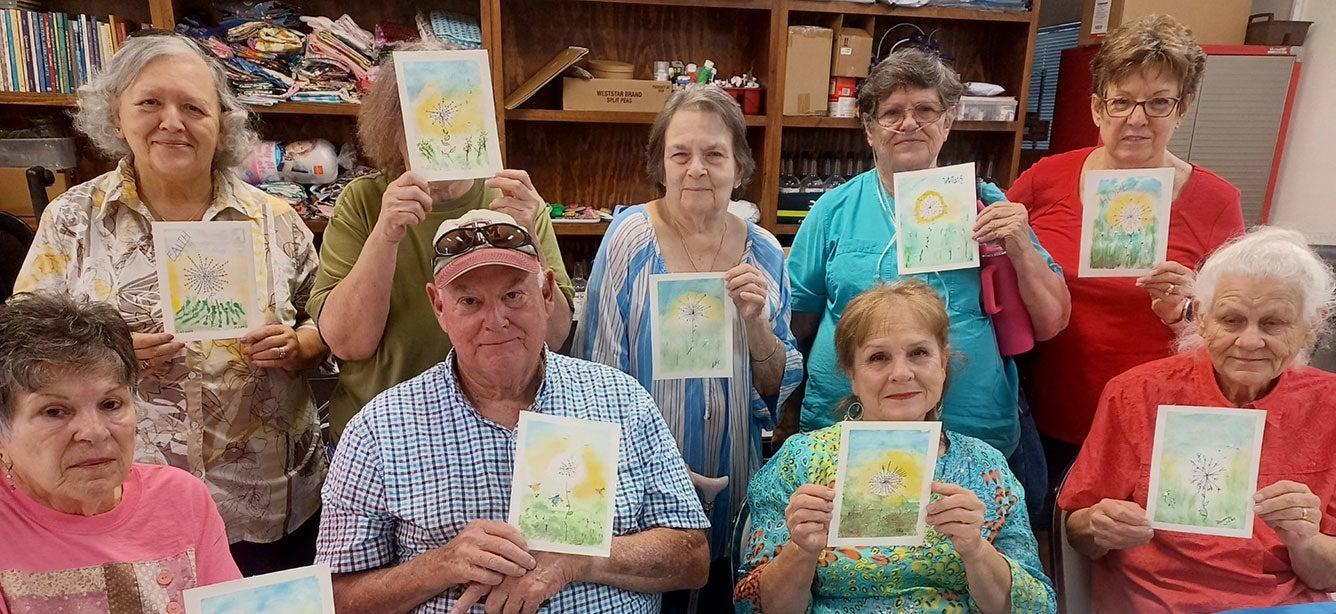Senior Center Spotlight: Newington Senior and Disabled Center Improves the Lives of Older Adults and Adults with Disabilities
5 min read

Almost all of the growing areas of the Newington Senior and Disabled Center Giving Garden, which delivers hundreds of pounds of produce each season to the local food pantry, are in raised beds and are navigable with concrete sidewalks and pathways. This attention to accessibility is evident throughout the center.
With a mission to improve the lives of older adults and adults with disabilities in the community, the center focuses on eight dimensions of well-being, offering programs and activities to meet a wide range of needs and interests. More than 1,700 older adults and adults with disabilities visit the center every year, participating in fitness activities, creative arts, recreation, adult learning, evidence-based programs, and more.
What is the history of the Newington Senior and Disabled Center?
In the 1970s and 1980s, older adults across the country organized clubs to socialize, enjoy entertainment, recreation, share a meal and, often, become civically engaged. In Newington, Connecticut, the members of a club that met weekly in a recreation building rallied for a building of their own.
When a school was decommissioned, the group lobbied for the town to renovate it as a senior center. They were joined in the effort by families of young adults with disabilities, and, in 1985, the Newington Senior and Disabled Center officially opened.
What happens at Newington Senior and Disabled Center?
The center has a robust information and referral center staffed by a social worker and a benefits enrollment worker. A congregate meal site, the center serves up to 50 people a day on-site and another 60 or more with home-delivered meals and also offers light lunches through a coffee shop. The center provides a local Dial-A-Ride program, connecting people to the center and the community through transportation. The center also has a durable medical equipment loan closet.
A municipal operation, the center has nine full-time paid staff and more than 90 volunteers, a 1:10 ratio. Volunteers are engaged in all aspects of the center, from the 32 who support the senior nutrition program each week, to those teaching classes and technology assistance, hospitality volunteers who organize and staff events, and a cadre of people who prepare tax returns through the AARP Tax-Aide program.
More recently, the center has partnered with the Board of Education’s Transition Academy, a program for students with disabilities who have graduated high school and who are not yet 21, to create a tutoring program. The center has embraced a self-directed teams approach to volunteering and has teams that operate:
- A coffee shop
- A consignment store
- A trip and travel program
- A small organic farm in the center’s back yard
The Giving Garden, now a reliable source of produce for the local food pantry, began with a small grant and a call for volunteers to create a garden.
Who comes to the Newington Senior and Disabled Center?
The center’s participants include older adults and adults with disabilities. Because of this and because of its central location in the state, the center provides a home for several organizations serving people with disabilities. This includes the Deaf Senior Club of Connecticut, a group of self-organized and mostly older adults who come together from all parts of the state once a week to participate in typical senior center activities but immersed in deaf language and culture. While the group operates independently, the center, often in collaboration with the State Department of Aging and Disability Services, provides some programs and information services. This has included providing evidence-based programs with trained leaders who are fluent in American Sign Language (ASL).
The center partners with a local service provider of day programs for adults with developmental disabilities who deliver meals on wheels several times a week and spend part of their afternoon at the Center. The Newington Special Olympics program is operated under the auspices of the center with a part time coordinator, administrative support, and space for practices. And, importantly, the accessibility guidelines provided by the Americans with Disabilities Act (ADA) are at the forefront of all of the center’s planning.
Celebrating the Americans with Disabilities Act 33rd anniversary
The ADA, a civil rights law that protects the rights of people with disabilities, prohibiting discrimination in employment and access to public places, was signed into law in 1990. The center supports an annual party in a local park that raises awareness of the ADA and of the barriers that still exist for people with disabilities. This year's party will celebrate the 33rd anniversary of the ADA. The celebration, hosted by Parks and Recreation, is funded by the ADA Coalition of Connecticut (ADACC), the state affiliate of the New England ADA Center, part of the National ADA Network. The center has also hosted the in-person conferences of the ADACC.
The ADA National Network, with affiliates in every state, is an excellent source of information, training, and resources to ensure organizations are complying with the ADA and ensuring people with disabilities have equal access to programs, facilities, employment, and services.
According to the ADA National Newtwork website, "The ADA National Network provides information, guidance and training on how to implement the Americans with Disabilities Act (ADA) in order to support the mission of the ADA to 'assure equality of opportunity, full participation, independent living, and economic self-sufficiency for individuals with disabilities.' Funded by the National Institute on Disability, Independent Living, and Rehabilitation Research (NIDILRR), the network consists of 10 Regional ADA Centers located throughout the United States and an ADA Knowledge Translation Center (ADAKTC). “
How did the COVID pandemic impact the Newington Senior and Disabled Center?
Like other senior centers, the Newington Senior and Disabled Center closed its doors to the public on March 13, 2020, then identified critical needs and innovated their approaches to meet those needs. The center was integral to the town’s emergency response, including the establishment of systems to help people get vaccinated.
The center, in partnership with the local public health district and three neighboring senior centers, are grantees in NCOA’s Vaccine Uptake Initiative. Recognizing that one approach did not meet the needs of everyone served by the center, they developed a hi-tech (virtual or online), lo-tech (telephone-based programs using a conference line), no-tech approach (parking lot events, at-home kits etc.) to programs and services. While attendance is back to pre-pandemic levels, there are many older adults who did not return to the center so they have retained this approach to provide critical connections.
What does modernization mean to the Newington Senior and Disabled Center?
According to Center Director Jaime Trevethan, modernization means continually looking at the demographics of the community and staying in tune with the changing needs to ensure they are relevant. She provided an example of older adults who are remaining or returning to the workforce and the rapidly changing impact of technology. How the center communicates with people—from the traditional printed newsletter to online versions, from mailers to email blasts and robocalls—and how how the center’s marketing needs to change.
What's next for the Newington Senior and Disabled Center?
The center has ambitious plans for renovations and upgrades. In its last budget, the state of Connecticut included an appropriation of $10 million dollars from ARPA funds to be awarded to municipalities to upgrade senior center facilities and programs. A funding formula was established that allocated shares to each municipality based not only on age demographics but that addresses equity by including race, prevalence of disability, and income status.
The center has submitted a proposal for its $90,000 allocation that includes expanding the garden to create more raised beds and sidewalks, converting its woodworking shop into a makerspace, sprucing up a lounge, and working with the high school art department to create a mural. Leveraging these funds, the center is also planning on renovating an elevated stage (accessible with a lift) to bring it to ground level and create program space and to update an outdoor area to create a more permanent outdoor classroom.
Still not a member of the National Institute for Senior Centers? Join today, membership is free.
If your center has engaged in a recent study or assessment or is trying out some new programming approaches, we’d love to hear about it. And if you haven't already, we'd encourage you to join the National Institute of Senior Centers (NISC). Free to all senior centers (and their personnel), NISC supports senior centers with best practices and innovations in programming, as well as networking and training opportunities. Ask for help, leverage NISC resources, or share your successes like the Newington Senior and Disabled Center. Find out how you can become a NISC Affiliate today.




